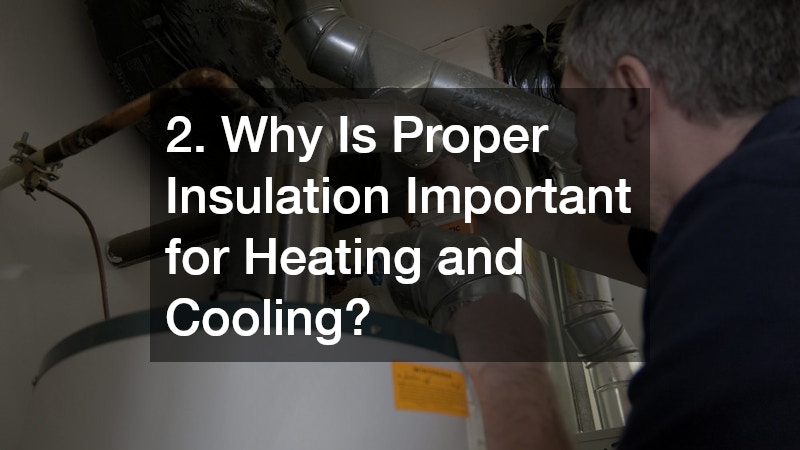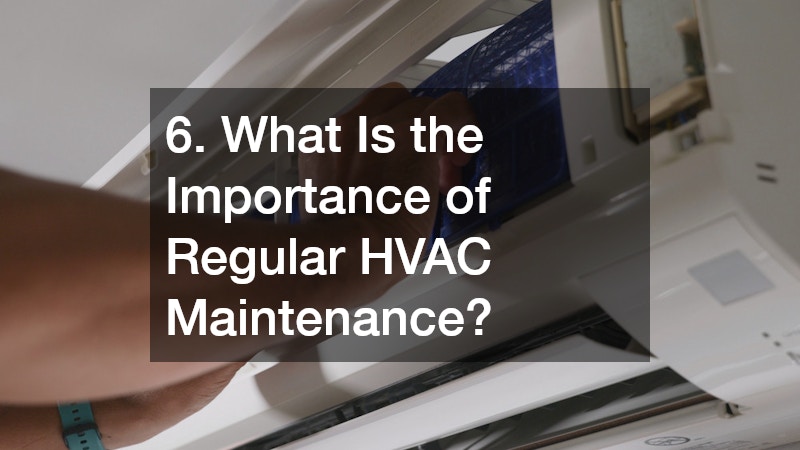When it comes to keeping your home perfectly heated and cooled, understanding the ins and outs of your HVAC system is crucial. From how HVAC works to the importance of proper insulation and regular maintenance, there are many factors to consider for optimal comfort. This comprehensive guide will cover everything you need to know about HVAC to maintain a perfectly heated and cooled home.
1. How Does HVAC Work?
Heating, ventilation, and air conditioning (HVAC) systems work by controlling the temperature, humidity, and air quality in your home. They achieve this by circulating air through ducts to deliver warm or cool air to different rooms. The system is controlled by a thermostat, which allows you to set the desired temperature for your home.
The role of thermostats is crucial in maintaining indoor comfort. Thermostats monitor the temperature and activate the HVAC system to heat or cool the air as needed. Programmable thermostats are particularly useful as they allow you to set temperature schedules for different times of the day, saving energy when you’re not at home.

2. Why Is Proper Insulation Important for Heating and Cooling?
Insulation plays a critical role in maintaining a consistent temperature in your home. It helps prevent heat loss in the winter and heat gain in the summer, reducing the load on your HVAC system. Types of insulation commonly used include fiberglass, cellulose, and spray foam, each offering different levels of thermal resistance.
Effective insulation not only enhances the comfort of your home but also saves energy and reduces utility bills. By sealing gaps and insulating walls, floors, and attics, you create a barrier against external temperature fluctuations, keeping your home heated and cooled efficiently.
3. What Are the Most Common HVAC System Types?
Central air conditioning systems are popular for providing whole-house cooling by distributing cool air through ducts and vents. They are typically paired with a furnace for heating, making them a versatile year-round solution. Forced air heating systems use ducts to deliver heated air from a central unit to different areas of the home.
When choosing an HVAC system, consider factors such as your home’s size, layout, and climate to determine the most suitable type. Consulting with a professional HVAC contractor can help you select the right system for optimal heating and cooling performance.
For those looking for efficient home heating and cooling without ductwork, ductless mini split installation solutions offer a flexible and energy-saving alternative. These systems consist of an outdoor compressor unit and indoor air handlers, providing zoned temperature control for different areas of the home.
4. How Often Should HVAC Filters Be Changed?
HVAC filters play a crucial role in maintaining indoor air quality by trapping dust, pollen, and other airborne particles. Regular filter changes are essential to prevent these contaminants from circulating in your home and affecting your HVAC system’s performance. It is recommended to replace filters every 1-3 months, depending on filter type and household conditions.
Ensuring clean filters not only prolongs the lifespan of your HVAC system but also maintains indoor air quality for a healthier living environment. Make filter maintenance a regular part of your HVAC care routine to keep your home heated and cooled effectively.
5. What Is the Ideal Temperature for Indoor Comfort?
Setting the thermostat to an appropriate temperature is essential for maintaining indoor comfort and energy efficiency. The ideal temperature can vary depending on personal preferences and the season, but a general recommendation is around 68-72 degrees Fahrenheit for heating and 78-82 degrees Fahrenheit for cooling.
Programmable thermostats allow you to schedule temperature adjustments based on your daily routine, optimizing comfort and saving energy when no one is home. By setting lower temperatures in winter and higher temperatures in summer while you’re away, you can reduce energy consumption without sacrificing comfort.

6. What Is the Importance of Regular HVAC Maintenance?
Regular HVAC maintenance is crucial for keeping your system running smoothly and efficiently. By scheduling annual tune-ups and inspections, you can address minor issues before they escalate into costly repairs. Maintenance tasks include cleaning coils, checking refrigerant levels, and inspecting electrical components.
Preventing breakdowns is one of the key benefits of regular maintenance. By identifying and addressing potential issues early, you can avoid unexpected system failures and discomfort in your home. Additionally, regular maintenance helps improve system efficiency, reducing energy consumption and lowering utility bills.
Investing in a maintenance plan with your HVAC service provider can ensure that your system receives the care it needs throughout the year. By staying proactive with maintenance, you can keep your home heated and cooled reliably and efficiently.
7. How Can HVAC Systems Help Improve Indoor Air Quality?
Air purification systems integrated into HVAC systems filter out contaminants such as dust, mold spores, and pet dander, improving indoor air quality. These systems help alleviate allergies and respiratory issues by reducing allergens and pollutants circulating in the air. HVAC UV lights are another option for killing bacteria and viruses in the air, enhancing the cleanliness of your home’s air supply.
Regular HVAC maintenance, including cleaning and replacing filters, is essential for ensuring optimal indoor air quality. Dirty filters can harbor allergens and impede airflow, compromising the effectiveness of air purification systems. By keeping filters clean and systems well-maintained, you can enjoy cleaner and healthier indoor air.
8. What Are the Benefits of Zoned HVAC Systems?
Zoned HVAC systems divide your home into separate zones with individual temperature controls, allowing for customized comfort in different areas. By adjusting temperatures based on room occupancy and preferences, zoned systems provide energy savings and increased comfort. They also eliminate hot and cold spots in your home, ensuring even heating and cooling throughout.
Energy savings are a significant advantage of zoned HVAC systems. By heating or cooling only the zones that are in use, you can avoid wasting energy on unoccupied areas and reduce your utility bills. Zoned systems also offer greater control over temperature settings, allowing each household member to enjoy personalized comfort.
Consult with local HVAC contractors experienced in zoned system installation to determine if this option is suitable for your home. Zoned HVAC systems are a smart investment for homeowners looking to optimize comfort, save energy, and enhance the efficiency of their heating and cooling systems.

9. How Does Humidity Impact Indoor Comfort?
High humidity levels can make your home feel sticky and uncomfortable, affecting your overall well-being. Excess moisture in the air can also lead to mold growth, musty odors, and potential structural damage. Using dehumidifiers can help control indoor humidity levels and improve the comfort and air quality of your home.
Dehumidifiers remove excess moisture from the air, reducing humidity levels and preventing mold and mildew growth. By maintaining optimal humidity levels (around 30-50%), you can create a more comfortable living environment and protect your home from moisture-related issues. Dehumidifiers are particularly beneficial in damp or humid climates where high humidity is a common concern.
Consult with your HVAC installation contractor about options for integrating dehumidifiers into your HVAC system for enhanced humidity control. Addressing indoor humidity issues not only improves comfort but also protects your home from potential damage and maintains a healthier living environment for you and your family.
10. Can HVAC Systems Help with Energy Efficiency?
Energy-efficient HVAC models are designed to reduce energy consumption while providing optimal heating and cooling performance. These systems use advanced technologies such as variable-speed motors, high-efficiency compressors, and smart thermostat integration to maximize energy savings. Investing in an energy-efficient HVAC system can lead to lower utility bills and reduced environmental impact.
Smart thermostats are another way HVAC systems can improve energy efficiency. These devices learn your heating and cooling preferences and adjust temperature settings automatically to optimize comfort and savings. By programming schedules and adjusting temperatures remotely, smart thermostats help you use energy more efficiently and reduce heating and cooling costs.
Consult with HVAC service providers specializing in energy-efficient solutions to explore options for upgrading your system. Energy-efficient HVAC systems not only save you money in the long run but also contribute to a more sustainable home by reducing energy waste and carbon emissions.
11. What Should Homeowners Know About HVAC Ductwork?
Properly sealed ductwork is essential for delivering heated and cooled air efficiently to all areas of your home. Leaky ducts can lead to energy loss, uneven heating or cooling, and reduced system performance. Duct sealing and insulation help prevent air leaks and maintain temperature consistency throughout your home.
Neglecting ductwork maintenance or air conditioning repair can impact the efficiency of your HVAC system and result in higher energy bills. Regular inspections and repairs of ductwork by a qualified HVAC contractor can help you maximize system performance and comfort in your home. Don’t overlook the importance of well-maintained ductwork for effective heating and cooling.

12. How Can Homeowners Troubleshoot Common HVAC Problems?
If you experience issues with your HVAC system, such as lack of heating or cooling, strange noises, or frequent cycling, there are troubleshooting steps you can take before calling a professional. Check the thermostat settings, the air filter, and the circuit breaker to ensure everything is functioning correctly. Clearing debris around the outdoor unit and checking for blocked vents can also help improve system performance.
If basic troubleshooting doesn’t resolve the issue, contact your local HVAC contractor for a professional diagnosis and repair. Experienced technicians can identify the root cause of HVAC problems and recommend appropriate solutions to restore your system’s functionality. Timely repairs and maintenance are key to avoiding larger issues and costly repairs down the line.
13. What Is the Lifespan of HVAC Systems?
The lifespan of HVAC systems varies depending on factors such as usage, maintenance, and system type. On average, a well-maintained HVAC system can last 15-20 years, with proper care and regular maintenance prolonging its lifespan. However, older systems may require more frequent repairs and eventually need to be replaced to ensure reliable heating and cooling.
Factors affecting HVAC system lifespan include climate conditions, usage patterns, and overall system care. Consulting with an HVAC contractor can help you assess the condition of your system and determine if it’s nearing the end of its lifespan. When considering HVAC replacement, weigh the costs of repairs and energy consumption against the benefits of a new, more efficient system.
14. What Are Some Common Myths About Heating and Cooling?
One common myth is that closing vents in unused rooms saves energy. In reality, closing vents can disrupt airflow and create pressure imbalances in your HVAC system, reducing efficiency and potentially damaging the system. Keeping all vents open allows for proper air circulation and temperature control throughout your home.
Another myth is that bigger HVAC units are better for heating and cooling larger spaces. Oversized units can actually lead to short cycling, where the system turns on and off frequently, resulting in uneven temperatures and increased wear on components. Properly sizing your HVAC system based on your home’s square footage and insulation levels is crucial for optimal performance.
Consult with your HVAC contractor to debunk common myths and misconceptions about keeping your home perfectly heated and cooled. By understanding the truth behind these myths, you can make informed decisions about HVAC maintenance, AC repairs, and energy-saving practices for your home.
15. How Can Homeowners Choose the Right HVAC Contractor?
When selecting an HVAC contractor for installation, repairs, or maintenance, it’s essential to consider factors such as credentials, experience, and customer reviews. Verify that the contractor is licensed, insured, and bonded to perform HVAC work in your area. Ask about their experience with HVAC systems similar to yours and inquire about their service warranties and guarantees.
Reading reviews and testimonials from past customers can give you insight into the contractor’s reputation and service quality. Positive feedback and recommendations from satisfied clients are indicators of a reliable and trustworthy HVAC contractor. Requesting references and contacting previous customers can also provide valuable information about the contractor’s workmanship and professionalism.
Choosing the right HVAC contractor can make a significant difference in the performance and longevity of your heating and cooling systems. By partnering with a reputable and qualified contractor, you can ensure that your HVAC needs are met with expert care and attention to detail.
In conclusion, keeping your home perfectly heated and cooled requires a combination of knowledge, maintenance, and smart decisions. By understanding how HVAC systems work, the importance of insulation, and the role of regular maintenance, you can create a comfortable and energy-efficient living environment. Consulting with HVAC professionals for installation, repairs, and maintenance will help you optimize the performance of your system and prolong its lifespan. Remember to prioritize indoor air quality, energy efficiency, and system reliability to enjoy a perfectly heated and cooled home year-round.


